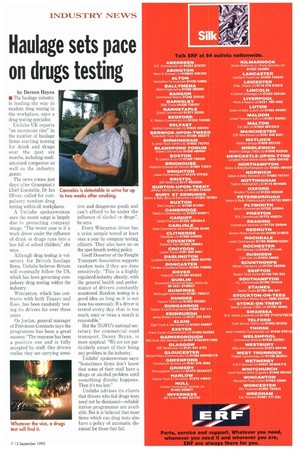Haulage sets pace on drugs testing
Page 13

If you've noticed an error in this article please click here to report it so we can fix it.
by Derren Hayes • The haulage industry is leading the way in random drug testing in the workplace, says a drug testing specialist.
Unilabs UK reports an enormous rise" in the number of haulage firms starting testing for drink and drugs over the past six months, including medium-sized companies as well as the industry giants.
The news comes just days after Grampian's Chief Constable, Dr Ian Oliver, called for compulsory random drug testing within all workplaces.
A Unilabs spokeswoman says the recent surge is largely due to protecting company image. "The worst case is if a truck driver under the influence of drink or drugs runs into a bus full of school children," she says.
Although drug testing is voluntary for British haulage firms, Unilabs believes Britain will eventually follow the US, which has laws governing compulsory drug testing within the industry.
Wincanton, which has contracts with both Texaco and Esso, has been randomly testing its drivers for over three years, Oz Jordan, general manager of Petroleum Contracts says the programme has been a great success: "The response has been a positive one and is fully accepted by staff. Our drivers realise they are carrying sensi tive and dangerous goods and can't afford to be under the influence of alcohol or drugs", he says.
Every Wincanton driver has a urine sample tested at least once a year by company testing officers. They also have an on the spot breath testing policy.
Geoff Dossetter of the Freight Transport Association supports random tests if they are done sensitively: "This is a highly regulated industry already, with the general health and performance of drivers constantly monitored. Random testing is a good idea as long as it is not done too onerously. If a driver is tested every day that is too much, once or twice a month is reasonable."
But the TGWU's national secretary for commercial road transport, Danny Bryan, is more sceptical: "We are not particularly aware of their being any problem in the industry.
Unilabs' spokeswoman says: "Sometimes firms don't know that some of their staff have a drugs or alcohol problem until something drastic happens. Then it's too late."
Unilabs advises its clients that drivers who fail drugs tests need not be dismissed—rehabilitation programmes are available. But it is believed that most firms which run drug tests also have a policy of automatic dismissal for those that fail.
















































































































